Related Research Articles

A security is a tradable financial asset. The term commonly refers to any form of financial instrument, but its legal definition varies by jurisdiction. In some countries and languages people commonly use the term "security" to refer to any form of financial instrument, even though the underlying legal and regulatory regime may not have such a broad definition. In some jurisdictions the term specifically excludes financial instruments other than equities and fixed income instruments. In some jurisdictions it includes some instruments that are close to equities and fixed income, e.g., equity warrants.

A stock market, equity market, or share market is the aggregation of buyers and sellers of stocks, which represent ownership claims on businesses; these may include securities listed on a public stock exchange as well as stock that is only traded privately, such as shares of private companies that are sold to investors through equity crowdfunding platforms. Investments are usually made with an investment strategy in mind.

Euronext Dublin is Ireland's main stock exchange, and has been in existence since 1793.
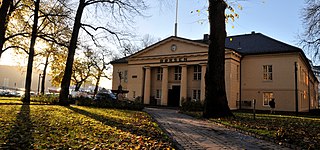
Oslo Stock Exchange is a stock exchange within the Nordic countries and offers Norway's only regulated markets for securities trading today. The stock exchange offers a full product range including equities, derivatives and fixed income instruments.
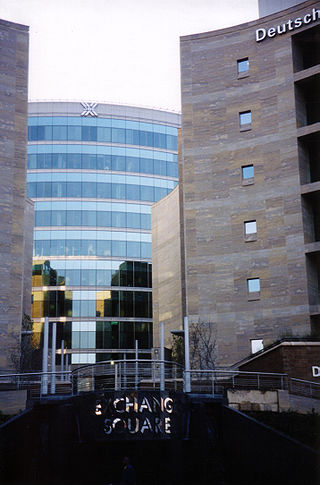
JSE Limited is the largest stock exchange in Africa. It is located in Sandton, Johannesburg, South Africa, after it moved from downtown Johannesburg in 2000. In 2003 the JSE had an estimated 473 listed companies and a market capitalisation of US$182.6 billion, as well as an average monthly traded value of US$6.399 billion. As of March 2022, the market capitalisation of the JSE was at US$1.36 trillion.

B3 S.A.– Brasil, Bolsa, Balcão, formerly BM&FBOVESPA, is a stock exchange located in São Paulo, Brazil, and the second oldest of the country.

The Iraq Stock Exchange (ISX), formerly the Baghdad Stock Exchange, is a stock exchange in Baghdad, Iraq. It was established by the Coalition Provisional Authority (CPA) Order No. 74 as a sui generis independent non-profit organization on April 18, 2004. This order also created the Iraq Securities Commission and an Iraq Depositary. The stock exchange was part of the development of the country from a non-transparent centrally planned economy to a free market economy through a dynamic private sector.

Budapest Stock Exchange(BSE) (Hungarian: Budapesti Értéktőzsde (BÉT)) is the 2nd largest stock exchange in Central and Eastern Europe by market capitalization and liquidity. It is located at 55 Krisztina Boulevard, Budapest, Hungary, in the Buda Centre of the Hungarian National Bank Previously, from 1864, during the Austro-Hungarian Empire it was located in the Budapest Stock Exchange Palace building, until a large trading floor was necessary. The exchange is controlled by listed issuers, by Hungarian private investors and by the central bank. The BSE is member of the World Federation of Exchanges and the Federation of European Securities Exchanges.
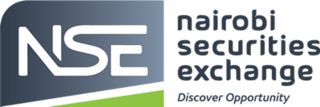
The Nairobi Securities Exchange (NSE) was established in 1954 as the Nairobi Stock Exchange, based in Nairobi the capital of Kenya. It was a voluntary association of stockbrokers in the European community registered under the Societies Act in British Kenya. The exchange had 66 listed companies in February 2021.

The Ghana Stock Exchange (GSE) is the principal stock exchange of Ghana. The exchange was incorporated in July 1989 with trading commencing in 1990. It currently lists 42 equities and 2 corporate bonds. All types of securities can be listed. Criteria for listing include capital adequacy, profitability, spread of shares, years of existence and management efficiency. The GSE is located within the Cedi House in Accra.
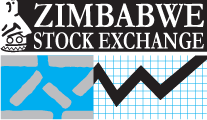
The Zimbabwe Stock Exchange, or ZSE, is the official stock exchange of Zimbabwe. Its history dates back to 1896 but has only been open to foreign investment since 1993. The exchange has about a dozen members, and currently lists 63 equities. There are two primary indices, the ZSE All Share and the ZSE Top 10.

The Tehran Stock Exchange (TSE) is Iran's largest stock exchange, which first opened in 1967. The TSE is based in Tehran. As of May 2023, 666 companies with a combined market capitalization of US$1.45 trillion were listed on TSE. TSE, which is a founding member of the Federation of Euro-Asian Stock Exchanges, has been one of the world's best performing stock exchanges in the years 2002 through 2013. TSE is an emerging or "frontier" market.
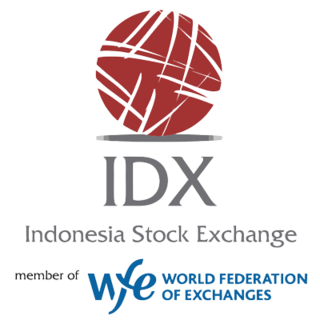
Indonesia Stock Exchange (IDX) is a stock exchange based in Jakarta, Indonesia. It was previously known as the Jakarta Stock Exchange (JSX) before its name changed in 2007 after merging with the Surabaya Stock Exchange (SSX). In recent years, the Indonesian Stock Exchange has seen the fastest membership growth in Asia. As of January 2024, the Indonesia Stock Exchange had 903 listed companies, and total stock investors were about 6.4 million, compared to 2.5 million at the end of 2019. Indonesia Market Capitalization accounted for 45.2% of its nominal GDP in December 2020. Founded on 30 November 2007, it is ASEAN's largest market capitalization at US$744 billion as of 15 December 2023.
NYSE Euronext, Inc. was a transatlantic multinational financial services corporation that operated multiple securities exchanges, including the New York Stock Exchange, Euronext and NYSE Arca. NYSE merged with Archipelago Holdings on March 7, 2006, forming NYSE Group, Inc. On April 4, 2007, NYSE Group, Inc. merged with Euronext N.V. to form the first global equities exchange, with its headquarters in Lower Manhattan. The corporation was then acquired by Intercontinental Exchange, which subsequently spun off Euronext.

The Douala Stock Exchange was the official market for securities in Cameroon, located in Douala. In 2019 it was absorbed by the Central African Securities Exchange which on that occasion relocated from Libreville to Douala.

The Jamaica Stock Exchange is the principal stock exchange of Jamaica, also known as JSE. Incorporated in 1968, JSE opened in 1969 in Kingston, Jamaica. Today, the JSE is one of the largest stock exchanges in the Caribbean by size and market capitalization. As of 30 September 2019, there is a total number of 85 companies and 120 securities listed to the JSE, and a market capitalization of just over JM$2 trillion. The Jamaica Stock Exchange is composed of multiple markets: Main Market, Junior Market, USD Market, and Bond Market. The JSE is also recognized as one of the most sector-diverse exchanges in the Caribbean. The key sectors include banking and finance, retail, manufacturing, insurance, leisure, communications, conglomerate, and services and real estate. The current chairman is Ian McNaughton and the deputy chairman is Gary Peart. The managing director is Marlene Street Forrest.

The Mongolian Stock Exchange is Mongolia's sole stock exchange. It is based in Ulaanbaatar and was established in January 1991 by the decree of the Mongolian Government to privatize state-owned assets.
The S&P/ASX 300, or simply, ASX 300, is a stock market index of Australian stocks listed on the Australian Securities Exchange (ASX). The index is market-capitalisation weighted, meaning each company included is in proportion to the indexes total market value, and float-adjusted, meaning the index only considers shares available to public investors.
ASEAN Exchanges is a collaboration of the 7 exchanges from Malaysia, Vietnam, Indonesia, Philippines, Thailand and Singapore to promote the growth of the ASEAN capital market by bringing more ASEAN investment opportunities to more investors.

Asia Frontier Capital Ltd. is an investment company created by a management buyout of Leopard Capital by the former CFO and COO, Thomas Hugger, at the end of May 2013. Leopard Capital Management Ltd. was subsequently renamed Asia Frontier Capital Ltd. The group manages the AFC Asia Frontier Fund, AFC Iraq Fund, AFC Uzbekistan Fund, and AFC Vietnam Fund. All funds are open-end funds under the AFC Umbrella fund for US investors or AFC Umbrella fund (non-US) for investors outside from the US. Investors can subscribe or redeem the funds monthly at net asset value.
References
- ↑ Opening a Stock Exchange. Jenny A. Minier. University of Miami. January 2001.
- ↑ LEVINE, ROSS. "Stock Markets: A Spur to Economic Growth". World Bank's Policy Research Department. Retrieved 2008-12-13.
- ↑ Irving, Jacqueline. "Africa's struggling stock exchanges Boost to economic development or "costly irrelevance"?". un.org. Retrieved 2008-12-13.
- ↑ "Angola stock exchange to open this year". 2005. Retrieved 2008-12-13.
- ↑ Jeffs, Luke (2007-02-12). "Mongolia earns a sporting chance with fledgling operation". Dow Jones Financial News Online. Retrieved 2007-09-11.
- ↑ Cheng, Patricia (2006-09-19). "Mongolian bourse seeks foreign investment". International Herald-Tribune. Retrieved 2007-09-11.
- ↑ Angola stock exchange to open this year from Afrol.com, 21 February 2006
- ↑ Stock Exchange Opens in 2008 from AllAfrica.com, 29 December 2007
- ↑ Angola sees double digit growth in 2009 - deputy PM [ dead link ], Reuters, 6 August 2008
- ↑ "Maldives%20Presentation" (PDF). cmda.gov. Retrieved 2008-12-15.
- ↑ Michaels, Jim (2008-10-05). "Iraqi stock exchange small but surging". USA TODAY. Retrieved 2008-12-13.
- ↑ Daragahi, Borzou (May 24, 2005). "Putting stock in Iraq Baghdad exchange is a whirlwind of fierce optimism". sfgate. Retrieved 2008-12-13.
- ↑ "Iraqi stock exchange holds 3 trading sessions a week" . Retrieved 2008-12-13.
- 1 2 Haynes, Deborah (2007-12-20). "Baghdad stock exchange set to share in digital age". The Times. London. Retrieved 2008-12-13.
- ↑ Pepper, Daniel (Feb 6, 2008). "Baghdad's Stock Market Goes Modern". time. Archived from the original on February 9, 2008. Retrieved 2008-12-13.
- ↑ "What is the Smallest Stock Exchange in the World?" . Retrieved 2008-12-15.